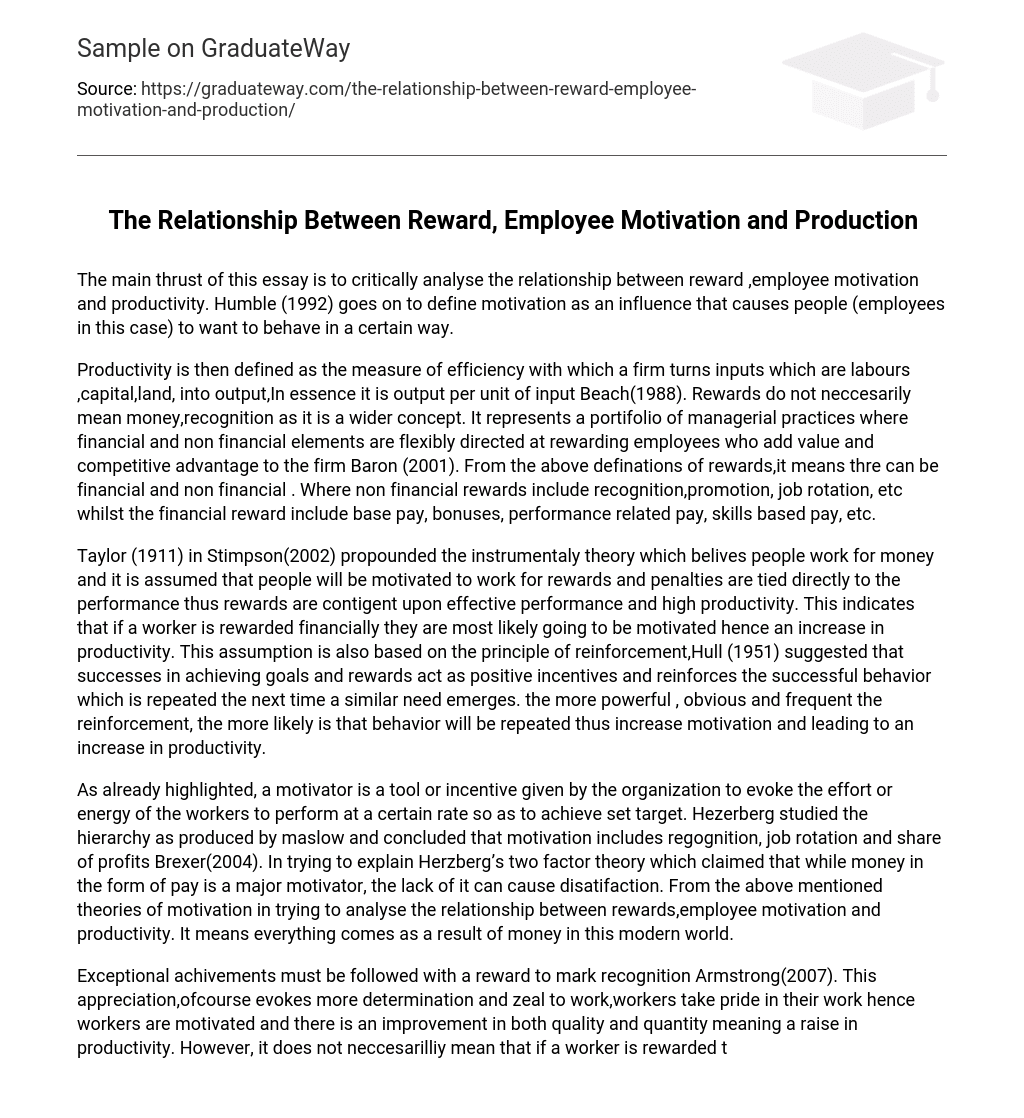The main thrust of this essay is to critically analyse the relationship between reward ,employee motivation and productivity. Humble (1992) goes on to define motivation as an influence that causes people (employees in this case) to want to behave in a certain way.
Productivity is then defined as the measure of efficiency with which a firm turns inputs which are labours ,capital,land, into output,In essence it is output per unit of input Beach(1988). Rewards do not neccesarily mean money,recognition as it is a wider concept. It represents a portifolio of managerial practices where financial and non financial elements are flexibly directed at rewarding employees who add value and competitive advantage to the firm Baron (2001). From the above definations of rewards,it means thre can be financial and non financial . Where non financial rewards include recognition,promotion, job rotation, etc whilst the financial reward include base pay, bonuses, performance related pay, skills based pay, etc.
Taylor (1911) in Stimpson(2002) propounded the instrumentaly theory which belives people work for money and it is assumed that people will be motivated to work for rewards and penalties are tied directly to the performance thus rewards are contigent upon effective performance and high productivity. This indicates that if a worker is rewarded financially they are most likely going to be motivated hence an increase in productivity. This assumption is also based on the principle of reinforcement,Hull (1951) suggested that successes in achieving goals and rewards act as positive incentives and reinforces the successful behavior which is repeated the next time a similar need emerges. the more powerful , obvious and frequent the reinforcement, the more likely is that behavior will be repeated thus increase motivation and leading to an increase in productivity.
As already highlighted, a motivator is a tool or incentive given by the organization to evoke the effort or energy of the workers to perform at a certain rate so as to achieve set target. Hezerberg studied the hierarchy as produced by maslow and concluded that motivation includes regognition, job rotation and share of profits Brexer(2004). In trying to explain Herzberg’s two factor theory which claimed that while money in the form of pay is a major motivator, the lack of it can cause disatifaction. From the above mentioned theories of motivation in trying to analyse the relationship between rewards,employee motivation and productivity. It means everything comes as a result of money in this modern world.
Exceptional achivements must be followed with a reward to mark recognition Armstrong(2007). This appreciation,ofcourse evokes more determination and zeal to work,workers take pride in their work hence workers are motivated and there is an improvement in both quality and quantity meaning a raise in productivity. However, it does not neccesarilliy mean that if a worker is rewarded there is automatic motivation and productivity. Stimpson posits that every firm has to plan a set motivators that evoke workers to work harder. the organization may also consider variables like the ability such as individual characters such as intelligence, knowledge, skills and role perception thus what individuals.
In explaining Herzberg’s two factor theory, Snyderman (1957) in Beach (1988) emphersises that employees have different needs and wants meaning what motivates one is different from what motivates the other hence it can not be assumed that money motivates everyone. People who work just for the money could find their tasks less desirable and may not therefore do them so well leading to a decrease in productivity. Herzberg noted that the absence of hygiene factors ,which is basic salary,may lead to job dissatisfaction and their presents does not mean workers get motivated, hygiene factors therefore act as as a foundation for motivation. In addition reinforcements act as motivators and leads to increased productivity but conversely failures or punishment provides negative reinforcement suggesting that it is necessary to seek alternative means of achieveing goals Hull (1951).
The extent to which experience shape future behavior depends firstly on the exetent to which individuals correctly perceive the connection between the bahaviours and its outcome. Secondly, it depends on the extent to which they are able to recognize the resemblance between the previous situation and the one. Perpective ability varies with people as does the ability to identify connections between events, some holds true that some employees are motivated more than others . Meaning rewarding an employee will not gurantee an increase in motivation and productivity In conclusion, an employee must be rewarded in order to increase the morale of the individual,as it will result in the increase in productivity.
An organization must have an assortment of motivation tools that allows variety of choices for different workers with different qualifications and needs so that each employee in the organization is motivated.





